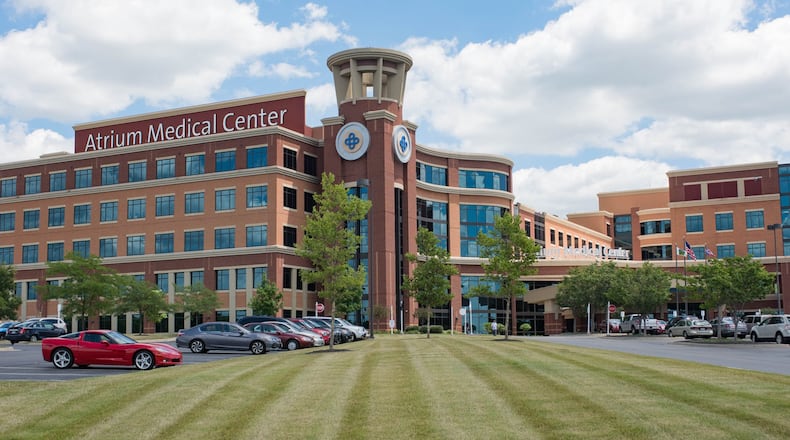On March 12, the state banned visitors at nursing homes and other rehabilitative centers and facilities across Ohio. The lockdown was ordered to protect these elderly and other vulnerable individuals away from possible exposure to the COVID-19 pandemic.
Here is a roundup of visitation policies for local hospitals and healthcare facilities:
Atrium Medical Center/Premier Health amended its visitation policy on March 20 with other hospitals who are members of the Greater Dayton Area Hospital Association. That policy does not allow hospitalized patients to have visitors in an effort to limit the spread COVID-19. There are exceptions being made in certain circumstances such as maternity patients; a surgical or outpatient procedure; end of life situations; emergency room visit; minor patients; and patients who require some type of assistance.
The policy does not permit visitors for confirmed or suspected COVID-19 patients; and no visitors under 18 years of age will be permitted in the emergency department, ambulatory or outpatient setting.
All visitors to hospitals, and select community ambulatory facilities, will be screened for symptoms, exposure, or travel history. In addition, visitors will be asked to leave the facility if they have had symptoms in the past 24 hours or exposures in the last 14 days and if the visitor is a driver for a patient, they will be asked to wait in their car until the patient’s appointment is completed.
Visitors must wash their hands, or use hand sanitizer, before and after leaving rooms and hospital buildings.
Kettering Health Network/Fort Hamilton Hospital in Hamilton and the Kettering Health Middletown facility are also following the same policy as other Dayton region hospitals and are not allowing visitors for hospital patients. Spokeswoman Liz Long said all area hospitals have plans in place in case of outbreaks. She also said the Kettering Health Network had already activated their incident command center.
Mercy Health/Fairfield Hospital spokeswoman Nanette Bentley said there were no changes in the current visitation restrictions to protect the health of patients, visitors, health care providers and communities. She said Mercy Health are asking people not to visit its facilities, including senior services and long-term care locations.
For mother/baby and pediatric patients, visitors are limited to a designated partner or primary caretaker/guardian, only one at a time, according to its website. Exceptions will be considered based on end-of-life situations or when a visitor is essential for the patient’s emotional well-being and care.
TriHealth/Bethesda Butler Hospital in Hamilton, McCullough-Hyde Hospital in Oxford, and Bethesda Arrow Springs in Lebanon implemented a new restriction on Wednesday that will not permit visitors into any clinical settings, with the following exceptions: patients nearing end of life, patients delivering a baby, and all visitors must be recorded at the facility's COVID-19 command center.
However, those exceptions will have the following rules applied:
No visitors will be admitted who have been traveled in the last 30 days to any international destination, New York state or Washington state; all visitors must check in at a nurse’s station and use hand sanitizer entering a patient care area; no minors are allowed inside the hospital.
Christ Hospital/Liberty Twp. campus began restricting visitors there and at its Cincinnati campus on March 13.
The hospital is making exceptions for: a single individual responsible for transporting a patient coming for a procedure or being discharged from the hospital; a single designated partner or primary caretaker for mothers delivering babies;or end-of-life situations.
Visitors who meet these exemption criteria will be evaluated at the door upon arrival.
In addition, individuals coming to one of the hospitals ambulatory outpatient centers or physician offices will be restricted to a single visitor responsible for transportation, or visitors at the discretion of the healthcare provider.
UC Health/West Chester Hospital and UC Medical Center in Clifton have stopped allowing visitors on their campuses as of March 23. However, there are two exceptions to this rule: Cases where a visitor restriction will produce an undue hardship for the patient or family; and in cases where the restriction would be detrimental to the care of the patient, according to its website.
In cases where a visitor is permitted with the permission of the nurse manager and/or medical director, they will be screened upon entrance. Only one visitor will be permitted.
How to take precautions
- Wash hands often with soap and water for at least 20 seconds; dry hands with a clean towel or air dry hands.
- Use alcohol-based hand sanitizer when soap and water are unavailable.
- Cover your mouth with a tissue or sleeve when sneezing or coughing.
- Avoid touching your eyes, nose, or mouth with unwashed hands.
- Stay home when you are sick.
- Avoid contact with people who are sick.
- Clean "high-touch" surfaces daily. These include counters, tabletops, doorknobs, light switches, bathroom fixtures, toilets, phones, keyboards, desks, and tablets.
- Source: Ohio Department of Health
About the Author

